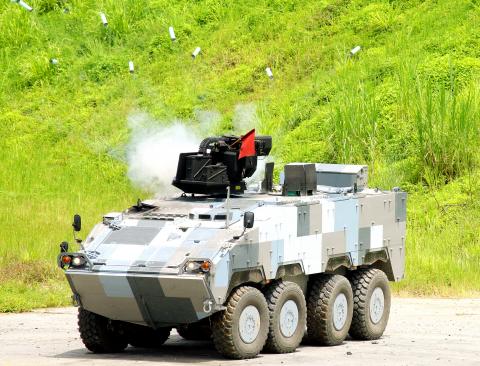Taiwan’s problem-plagued CM-32 “Clouded Leopard” armored infantry fighting vehicle ran into more difficulties this week with the announcement that delivery would be delayed by another five years, but the military denied that this was linked to steel-plate cracking and other design issues.
First unveiled in January 2005, the domestically produced eight-wheel-drive vehicle has encountered various problems from its inception and came close to being abandoned altogether in 2009 over design flaws and budgetary irregularities at the Ministry of National Defense, which resulted in the legislature’s decision to freeze two-thirds of the production budget.
Earlier this week, the Chinese-language United Daily News reported that cracking in the vehicle’s steel plating — which first surfaced three years ago — as well as disagreements over what type of cannon to use on the mounted turret, had prompted a decision to delay delivery of the vehicle by five years to 2019.

Photo: CNA
The 25-tonne Clouded Leopard, a joint project between the Ordnance Readiness Development Center and the Chungshan Institute of Science and Technology started in 2000, is intended as a replacement for older armored personnel carriers and light-armed vehicles, including M113s and V-150s. Mass production, initially scheduled for 2007, began in late 2010, with the army set to procure 652 CM-32s for NT$58 billion (US$1.8 billion), or about US$2.7 million per vehicle.
Under the plan, the vehicles were scheduled for delivery in 2014. So far, only a limited number have been handed over to the army and to the Military Police for presidential protection.
Clarifying the matter, the min said it had suspended mass production after the chassis of four of the 14 CM-32s manufactured in 2008 displayed some cracks, but resumed full production in December 2010 after the problem was resolved.
“We instructed Army Command Headquarters, the Ordnance Readiness Development Center and the CSIST to form a taskforce, and to invite academics to jointly ascertain the causes of the cracks and address the problems,” the ministry said.
Production of all 652 CM-32s will be done by 2019, it said, without providing reasons for the current delay.
Additional reporting by Stacy Hsu

CHAOS: Iranians took to the streets playing celebratory music after reports of Khamenei’s death on Saturday, while mourners also gathered in Tehran yesterday Iranian Supreme Leader Ayatollah Ali Khamenei was killed in a major attack on Iran launched by Israel and the US, throwing the future of the Islamic republic into doubt and raising the risk of regional instability. Iranian state television and the state-run IRNA news agency announced the 86-year-old’s death early yesterday. US President Donald Trump said it gave Iranians their “greatest chance” to “take back” their country. The announcements came after a joint US and Israeli aerial bombardment that targeted Iranian military and governmental sites. Trump said the “heavy and pinpoint bombing” would continue through the week or as long

TRUST: The KMT said it respected the US’ timing and considerations, and hoped it would continue to honor its commitments to helping Taiwan bolster its defenses and deterrence US President Donald Trump is delaying a multibillion-dollar arms sale to Taiwan to ensure his visit to Beijing is successful, a New York Times report said. The weapons sales package has stalled in the US Department of State, the report said, citing US officials it did not identify. The White House has told agencies not to push forward ahead of Trump’s meeting with Chinese President Xi Jinping (習近平), it said. The two last month held a phone call to discuss trade and geopolitical flashpoints ahead of the summit. Xi raised the Taiwan issue and urged the US to handle arms sales to

BIG SPENDERS: Foreign investors bought the most Taiwan equities since 2005, signaling confidence that an AI boom would continue to benefit chipmakers Taiwan Semiconductor Manufacturing Co’s (TSMC, 台積電) market capitalization swelled to US$2 trillion for the first time following a 4.25 percent rally in its American depositary receipts (ADR) overnight, putting the world’s biggest contract chipmaker sixth on the list of the world’s biggest companies by market capitalization, just behind Amazon.com Inc. The site CompaniesMarketcap.com ranked TSMC ahead of Saudi Aramco and Meta Platforms Inc. The Taiwanese company’s ADRs on Tuesday surged to US$385.75 on the New York Stock Exchange, as strong demand for artificial intelligence (AI) applications led to chip supply constraints and boost revenue growth to record-breaking levels. Each TSMC ADR represents

State-run CPC Corp, Taiwan (CPC, 台灣中油) yesterday said that it had confirmed on Saturday night with its liquefied natural gas (LNG) and crude oil suppliers that shipments are proceeding as scheduled and that domestic supplies remain unaffected. The CPC yesterday announced the gasoline and diesel prices will rise by NT$0.2 and NT$0.4 per liter, respectively, starting Monday, citing Middle East tensions and blizzards in the eastern United States. CPC also iterated it has been reducing the proportion of crude oil imports from the Middle East and diversifying its supply sources in the past few years in response to geopolitical risks, expanding